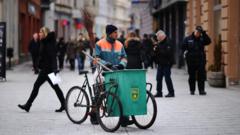Sarajevo is facing a worrying rise in rat-borne diseases, prompting emergency measures as infections increase amidst a backdrop of municipal neglect.
Crisis Alert: Rat-Borne Diseases Surge in Sarajevo

Crisis Alert: Rat-Borne Diseases Surge in Sarajevo
Health experts warn of rising public health risks in Bosnia’s capital due to rampant rat population.
In Sarajevo, the situation has reached a critical juncture as an upsurge in rat populations coincides with alarming reports of rat-borne illnesses. Residents have flooded social media with images showcasing rats swimming in the Miljacka river, coupled with complaints about overflowing garbage bins and the evident lack of cleanup for deceased animals in public spaces, including children’s playgrounds. This dire setting has enabled rats to proliferate, already leading to a spike in leptospirosis cases.
The local healthcare system is under strain, with Sarajevo’s largest hospital reporting a dozen new cases of leptospirosis in a single day this week. This illness, often dubbed rat fever due to its primary vector, typically spreads through water or soil contaminated by rodent excrement. Symptoms can vary from minor headaches to severe conditions like Weil's disease, which can cause organ failure and jaundice.
In response to what officials now classify as an epidemic, Sarajevo authorities are implementing immediate sanitation measures aimed at controlling the rat population. Extra sanitation crews have been dispatched to conduct comprehensive clean-ups across city parks, schools, and public areas. These actions come as a stark contrast to the inaction seen over the past two years, during which no pest control measures were in place due to a failed tender process aimed at extermination efforts.
Sarajevo Canton Health Minister Enis Hasanovic has framed the crisis as a "communal crisis," emphasizing the failure of local authorities to keep up with fundamental hygiene standards. Alarmingly, former director of the University Clinical Centre, Sebija Izetbegović, has issued warnings that the current rodent abundance could pave the way for hantavirus outbreaks, adding another level of concern to the ongoing health emergency.
Fortunately, so far, none of the reported leptospirosis cases have resulted in serious health implications. However, health experts continue to monitor the situation closely, as untreated leptospirosis carries a mortality rate exceeding 50% for severe cases, underscoring the urgency for effective municipal responses in Sarajevo.




















